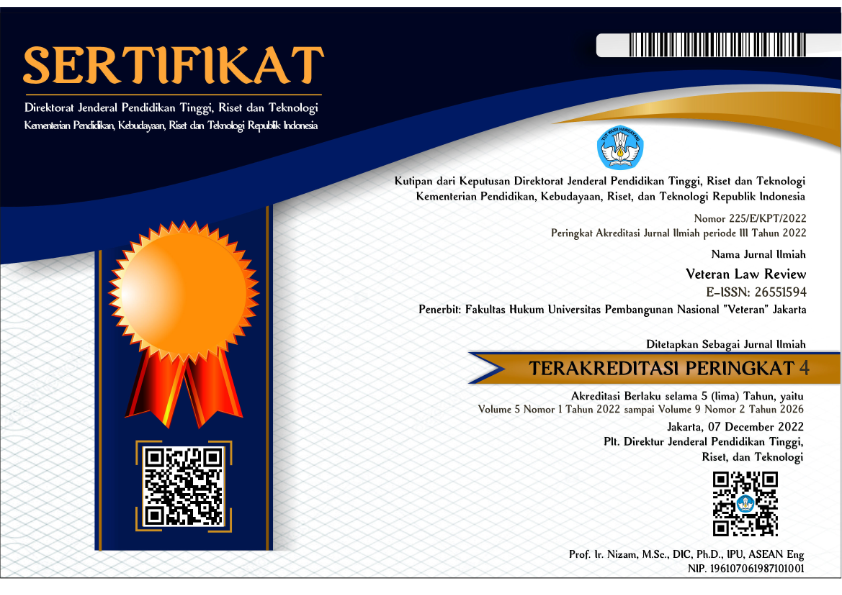The Importance in Providing Country of Origin Information on E-Commerce Platforms to Fulfill Consumer Rights in Indonesia
DOI:
https://doi.org/10.35586/velrev.v2i1.778Abstract
One of the threats of using the e-commerce system in Indonesian business sectors are the lack of goods and/or services information provided in the e-commerce platform, especially the country of origin information. The general standard of information that should be provided to consumers includes price, quality, and other information that can help consumers decide what to buy according to their needs and the quality of goods. The purpose of this study is to identify the importance of country of origin information in e-commerce platform based on consumer’s view. We used juridical-empirical research to find out how the implementation of a regulation. The primary sources were collected by observation method to the e-commerce platforms and survey method to the e-commerce customers. Based on theories and results, we conclude that country of origin information is important and should be provided by the merchants in the e-commerce platform. Providing country of origin information in e-commerce platform may benefit consumers and also may benefit e-commerce providers and merchants. The government needs to issue a new regulation to make e-commerce providers obligated to provide country of origin information for all of the products that their merchant sold. We also suggest the e-commerce providers to voluntarily and consciously requiring merchants selling on the platform to include country of origin information.
Downloads
References
Ab.Halim, M. ‘., Mohd, K. W., Salleh, M. M., Dr., A. Y., Omar, T. S., Ahmad, A., et al. (2014, March 19). Consumer Protection of Halal Products in Malaysia: A Literature Highlight. Procedia - Social and Behavioral Sciences, 121, 68-78.
Adina, C., Gabriela, C., & Roxana-Denisa, S. (2015). Country-of-Origin Effects on Perceived Brand Positioning. Procedia Economics and Finance, 23, 422-427.
Anumba, C., & Ruikar, K. (2002, April). Electronic commerce in construction—trends and prospects. Automation in Construction, 11(3), 265-275.
Barkatullah, A. H., & Djumadi. (2018, July-August). Does self-regulation provide legal protection and security to e-commerce consumers? Electronic Commerce Research and Applications, 30, 94-101.
Beiermann, J., Ritten, C. J., Thunström, L., & Ehmke, M. (2017, December). Measuring the value of information – revealed preferences for country of origin information. Journal of Behavioral and Experimental Economics, 71, 96-104.
Blibli. (2018). Syarat & Ketentuan. Retrieved 10 12, 2018, from Blibli: https://www.blibli.com/
Bloemer, J., Brijs, K., & Kasper, H. (2009). The CoO‐ELM model: A theoretical framework for the cognitive processes underlying country of origin‐effects. European Journal of Marketing, 43(1/2), 62-89.
Bukalapak. (2018). Aturan Penggunaan Bukalapak.com. Retrieved 10 12, 2018, from Bukalapak: https://www.bukalapak.com/terms
Corradi, A. (2015, January). International Law and Consumer Protection: The history of consumer protection. Retrieved from GlobaLex: http://www.nyulawglobal.org/globalex/International_Law_Consumer_Protection.html
Costa, C., Carneiro, J., & Goldszmidt, R. (2016, October). A contingent approach to country-of-origin effects on foreign products evaluation: Interaction of facets of country image with product classes. International Business Review, 25(5), 1066-1075.
Dichter, E. (1962). The world customer. The International Executive, 4(4), 25-27.
Dobrenova, F. V., Grabner-Kräuter, S., & Terlutter, R. (2015, October). Country-of-origin (COO) effects in the promotion of functional ingredients and functional foods. European Management Journal, 33(5), 314-321.
Godey, B., Pederzoli, D., Aiello, G., Donvito, R., Chan, P., Oh, H., et al. (2012, October). Brand and country-of-origin effect on consumers' decision to purchase luxury products. Journal of Business Research, 65(10), 1461-1470.
Hsu, C.-L., Westland, J. C., & Chiang, C.-H. (2015, June). Editorial: Electronic Commerce Research in seven maps. Electronic Commerce Research, 15(2), 147-158.
Ibarra, L., Partida, A., & Aguilar, D. (2015). Electronic commerce as a business strategy: Impact in consumption habits in Hermosillo, Sonora’s inhabitants. Procedia - Social and Behavioral Sciences, 175, 275-282.
iPrice insights. (2018, July). Peta ECommerce Indonesia. Retrieved from iPrice insights: https://iprice.co.id/insights/mapofecommerce/
JD.ID. (2018). Apakah Produk Luar Negeri itu? Retrieved 10 12, 2018, from JD.ID: https://www.jd.id/help/question-49.html
JD.ID. (2018). SYARAT & KETENTUAN. Retrieved 10 12, 2018, from JD.ID: https://www.jd.id/help/question-28.html
Lazada. (2018). Syarat dan Ketentuan Penggunaan. Retrieved 10 12, 2018, from Lazada: https://www.lazada.co.id/terms-of-use/?spm=a2o4j.home.footer_top.9.57994ceec54Nfz
Neacşu, N. A. (2016). Consumer Protection in Electronic Commerce. Bulletin of the Transilvania University of Braşov Series V: Economic Sciences, 9(58), 301-308.
Neelakanta, B. C. (2006, March). An Assesment of the Need for Effective Consumer Organizations in India and Japan within the Wider Concept of Globalization. V.R.F. Series(408), pp. 1-57.
Pleşea, D.-A. (2000). Domotica. Bucureşti: Editura Academiei de Studii Economice.
Shopee. (2018). Syarat Layanan. Retrieved 10 12, 2018, from Shopee: http://shopee.co.id/docs/3001
Shopee. (n.d.). Persyaratan Layanan Shopee Mall. Retrieved 10 12, 2018, from Shopee: https://shopee.co.id/docs/5336
Soekanto, S. (1986). Pengantar Penelitian Hukum (3rd ed.). Jakarta: UI-Press.
Svantesson, D. J. (2018, February). Enter the quagmire – the complicated relationship between data protection law and consumer protection law. Computer Law & Security Review, 34(1), 25-36.
Tokopedia. (2018). Syarat & Ketentuan. Retrieved 10 12, 2018, from Tokopedia: https://www.tokopedia.com/terms.pl#top
Williamson, P. O., Lockshin, L., Francis, I. L., & Loose, S. M. (2016, July). Influencing consumer choice: Short and medium term effect of country of origin information on wine choice. Food Quality and Preference, 51, 89-99.
Xie, Y., Chen, M., Zhang, W., & Cui, F. (2018, November 20). Neural correlates of country-of-origin image (COI) stereotype. Neuroscience Letters, 687, 164-168.
Yang, C. (2011). Analysis on Protection of E-commerce Consumer Network Privacy. Procedia Engineering, 15, 5519-5524.
Downloads
Published
How to Cite
Issue
Section
License
Copyright (c) 2022 Veteran Law Review Journal
Veteran Law Review © 2022 by Faculty of Law Universitas Pembangunan Nasional "Veteran" Jakarta is licensed under Creative Commons Attribution 4.0 International

1. License
The non-commercial use of the article will be governed by the Creative Commons Attribution license as currently displayed on Creative Commons Attribution 4.0 International.
2. Author(s)' Warranties
The author warrants that the article is original, written by the stated author(s), has not been published before, contains no unlawful statements, does not infringe the rights of others, is subject to copyright that is vested exclusively in the author, and free of any third party rights, and that any necessary written permissions to quote from other sources have been obtained by the author(s).
3. User/Public Rights
VELREV's spirit is to disseminate articles published are as free as possible. Under the Creative Commons Attribution-ShareAlike 4.0 International License. VELREV permits users to copy, distribute, display, and perform the work for non-commercial purposes only. Users will also need to attribute authors and VELREV to distributing works in the journal and other media of publications.
4. Rights of Authors
Authors retain all their rights to the published works, such as (but not limited to) the following rights;
- Reproduce the work
- Prepare derivative works based upon the work
- Distribute copies of the work
- Perform the work publicly
- Display the work publicly
- Copyright and other proprietary rights relating to the article, such as patent rights,
- The right to self-archive the article,
- The right to enter into separate, additional contractual arrangements for the non-exclusive distribution of the article's published version (e.g., post it to an institutional repository or publish it in a book), with an acknowledgement of its initial publication in this journal (Veteran Law Review).
5. Co-Authorship
If the article was jointly prepared by more than one author, any author submitting the manuscript warrants that he/she has been authorized by all co-authors to be agreed on this copyright and license notice (agreement) on their behalf, and agrees to inform his/her co-authors of the terms of this policy. VELREV will not be held liable for anything that may arise due to the author's internal dispute. VELREV will only communicate with the corresponding author.
6. Royalties
Being an open accessed journal and disseminating articles for free under the Creative Commons license term mentioned, author(s) are aware that VELREV entitles the author(s) to no royalties or other fees.
7. Miscellaneous
VELREV will publish the article (or have it published) in the journal if the article’s editorial process is successfully completed. JOSI's editors may modify the article to a style of punctuation, spelling, capitalization, referencing, and usage that deems appropriate. The author acknowledges that the article may be published so that it will be publicly accessible and such access will be free of charge for the readers as mentioned in point 3.


















